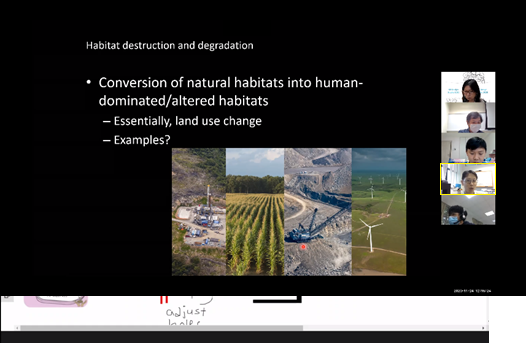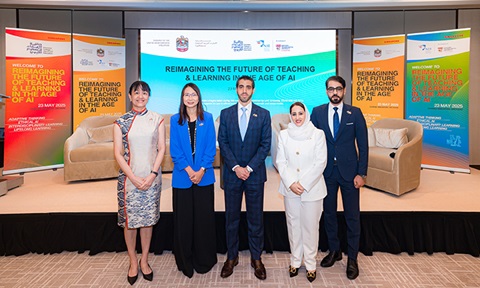Knowledge Building Design Studio 2020: Saving the Planet, Saving Lives
Introduction
The Knowledge Building Design Studio (KBDS2020), themed ‘Saving the Planet, Saving Lives’, was held from 23 to 25 November 2020. KBDS was borne out of a desire to cultivate an authentic knowledge building (KB) community among students, teachers, and researchers from various fields, and to engage and discuss with the community about real-world ideas. Due to social-distancing restrictions, the 3-day KBDS2020 was held in a fully virtual format.
KBDS2020 attracted a total of 57 students (ages 10 to 16 years) and 14 teachers from 10 schools across Singapore. Participants came together to meet with medical researchers from the Toronto Rehabilitation Institute (KITE), analysts from the Institute of Knowledge Innovation and Technology (IKIT) in Canada, and a researcher in local wildlife from the Natural Sciences and Science Education Academic Group (NSSE AG) in NIE. In addition, teachers took on the role of learning scientists in a parallel professional development (PD) strand that was embedded into the programme that was able to provide a seamless and connected PD experience for teachers using data on students’ capabilities for reflection.
A Virtual Design Studio
To fully engage participants in a virtual environment, the Knowledge Forum (KF) was designed to provide participants with generous spaces (views) to share their ideas within and across groups and also connect with experts and researchers to ask questions to deepen their understanding about the themes. Discussions with the KB community could be conducted in the various views and teachers were able to work broadly in three areas, namely, building of knowledge creating culture in schools, attributes and competencies of student knowledge builders, and teachers’ KB practice.

The various views on KF that participants could access to discuss and share ideas with each other: Welcome View (top left), Group View (top right), Community View (bottom left), and Teachers’ View (bottom right)
Outline of Activities
Dr Teo Chew Lee, Senior Research Scientist from the Office of Education Research, began the studio by welcoming all participating teachers, students, and researchers. The opening talk was given by Dr Donald Philip and Ms Noreen Goraya from KITE, who introduced various Challenging Environments Assessment Labs (CEALs) that simulate authentic environments and problems that people in the society commonly face. These CEALs (e.g., HomeLab) facilitate testing of different rehabilitative activities for affected personnel. Students were then presented with a challenge: design a model of a crutch that addresses the physical discomfort and environmental barriers that current users face.
In the teachers’ PD session, teachers shared their thoughts, ideas, and experiences on using KB and KF in their classrooms. Teachers commented on the expert-student interactions during the experts’ sharing, indicating their surprise at the type and quality of questions that were raised by their students, which was not commonly found in other classroom contexts.

Ms Noreen Goraya sharing about the ‘HomeLab’ at KITE
On the second day, Dr Ahmad Khanlari and Ms Leanna Ma, researchers from IKIT, were invited to analyse discussions from the first day using analytics and present their findings to the participants. The aim was to provide students with an overview of insights from the discussions and showcase common keyword usage by students across the groups. Students could then decide how to utilise the analytics to deepen their discourse and inquiries.

Students observed the similarities and patterns of keywords used across the groups, based on word clouds and network analyses
Dr Erik Jahner, an Associate Coordinator of Supplemental Instruction from California State University, shared with students about the parts of the brain, relation to emotions and memory, and how collection of emotional data can be used to influence learning processes.
Following this, Dr Norman Lim, a field ecologist and NSSE AG lecturer, gave a talk on biodiversity as an introduction to conservation of wildlife. Students then discussed about “Protecting Animals and Extinction” and subsequently shared their discussions and findings with the community. Within the teachers’ PD session, the analysts from IKIT shared in depth about KF analytics and how teachers can continue to explore and share their ideas, and work together beyond KBDS2020.

Dr Norman Lim (highlighted portrait) giving a talk on biodiversity and wildlife conservation
The final day began with the analysts from IKIT helping students to reflect and make sense of their discussions from the second day. The students broke into groups to consolidate their ideas in preparation for the final presentation at the end of the Design Studio, while teachers in the PD session discussed with more experienced KB teachers on the implementation of KB in lessons and implementations that benefit students.
KBDS2020 ended on a fitting note as students came together to present their findings and build on, showcase, and share a diversity of ideas and solutions that can be used to solve authentic problems related to the central theme of “Saving the Planet, Saving Lives.”

Students coming together to present their ideas and work to each other before the end of the Design Studio
Teachers’ and Students’ reflections
Overall, students’ responses and reflections were very encouraging and positive. They particularly enjoyed working on the challenges with students from other schools. By posting their ideas on KF, the students advanced their understanding and reflected on their emotions throughout the Design Studio. The teachers thought deeply about their observations of students’ KB efforts that can be implemented in their own classrooms.
In all, from the feedback gathered after the conclusion of KBDS2020, teachers and students were delighted to have participated and have benefitted greatly during this year's Design Studio, with intentions to continue with KB practices back in their own schools. Moving forward, KBDS2020 has shown that students’ inquiry can be pervasive beyond a virtual Design Studio and that this year’s Design Studio is not the end of the journey for knowledge builders, but rather the start of a new trajectory of deeper inquiry and part of a new norm for students and teachers.

Hope to see everyone at KBDS2021!



.tmb-listing.jpg?Culture=en&sfvrsn=16b12639_1)
.tmb-listing.jpg?Culture=en&sfvrsn=d641a0cb_1)


